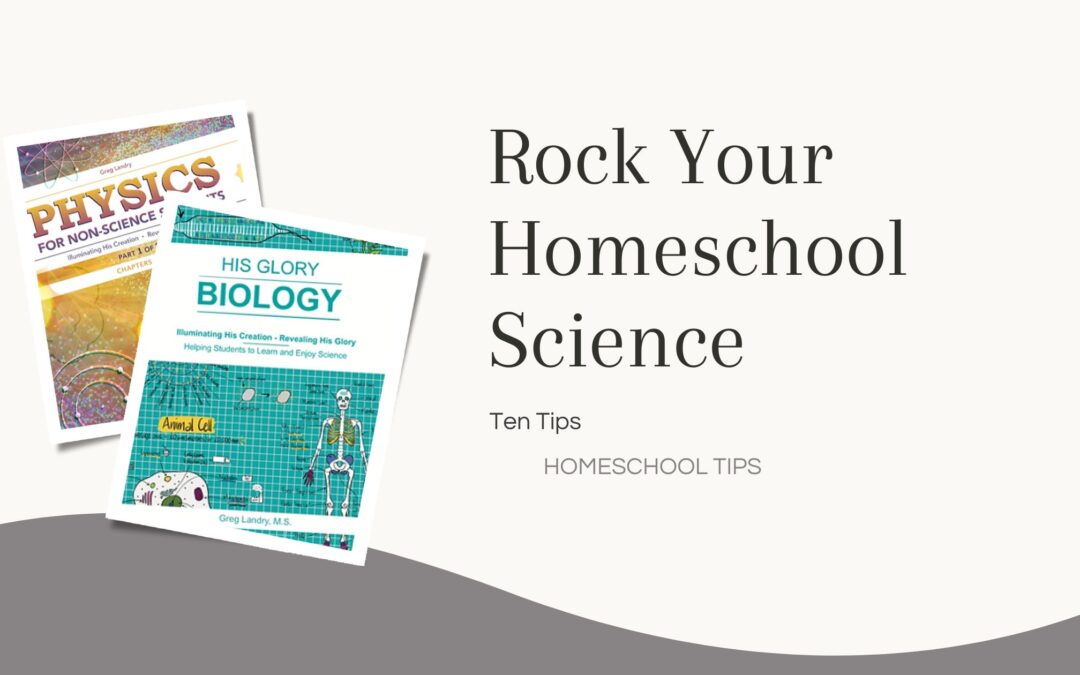This post will give you the best tips for homeschool science.
This is a sponsored post and My Homeschool with a View, LLC was compensated to write about Homeschool Science and feature the great products from College Prep Science. For more information on sponsored posts, read our Affiliate and Advertising Disclosure. Thank you to College Prep Science for sponsoring this post. This post contains affiliate links.
Homeschool science is one of those love-it-or-hate-it kind of subjects. Between finding the right homeschool science curriculum, gathering lab supplies, and actually teaching the subject, it can feel like a lot. This is especially true if it is a subject you’re not totally into.
I fall somewhere toward the hate-it side of the subject. See, I’ve always had high ideals for homeschool science activities, but the reality never meets the beautiful picture in my head.
The right homeschool science curriculum? I’ve tried too many to count.
Lab supplies and chemicals? It’s so great buying a big container full of something when you only need a teaspoon.
But I am not here to tell you all of my science woes. Actually, I have learned a few things in the process of finding the best homeschool science resources. And now you get to learn these things too.
In this post I am giving you my top ten tips for rocking your homeschool science curriculum. You will learn about the best homeschool science curriculum, including homeschool classes online, homeschool labs online, and homeschool science textbooks.
Tips to Rock How You Teach Homeschool Science
1. Use Homeschool Labs Online
I am giving you my best tip right out of the gate. Homeschool labs online are my absolute favorite way to rock homeschool science. No more cabinets full of lab equipment or chemicals you can’t get rid of. And no risk of real fires while conducting chemistry experiments.
Greg Landry’s Homeschool Science offers the best homeschool labs online I have found. The virtual interactive labs let my kids fully participate in the labs and conduct experiments. Most others I have looked at offer videos where you watch someone demonstrate the experiments, without really interacting with the material. This is why Greg Landry’s Homeschool Science Labs are our favorite at My Homeschool with a View.
2. Adjust your Homeschool Science Expectations
In other words, don’t overly complicate science instruction. It’s often thought that homeschooling needs to be constantly rigorous and challenging. This is especially true in the high school years.
But here’s the truth. Education doesn’t need to be difficult, for it to be excellent. Difficult often ends up in burnout and we end up with intelligent kids that don’t enjoy academic learning.
While some kids thrive with a rigorous, college prep science curriculum, others need the slower pace of a more life prep science option. In the end, both paths lead to learning, which is really the entire point of homeschooling anyway.
I took the life prep approach for biology and chemistry for my oldest. He enjoyed his science education and was able to complete both courses in one year. As a result, he is able to do dual enrollment at age 16 and get some college science done in high school.
No, it wasn’t a rigorous college prep program he did in high school, but the excellent instruction he got from his online science classes resulted in him being prepared for college courses. I credit Greg Landry, MS for being a great instructor, as there’s no way I could have made high school science this great on my own.
3. Use a Variety of Resources
Keeping things fresh and engaging helps build an interest in homeschool science. We all need a change of scenery once in a while, and homeschool science curriculum is no exception.
Using a variety of resources, such as virtual science labs, online classes for homeschool, student-friendly homeschool science textbooks and living books helps hold interest in a topic that may not be naturally engaging for all kids.
Family science memberships are an easy and cost effective way to access a variety of resources to enhance your homeschool science curriculum.
4. Incorporate Immersive Science Experiences
Creating immersive experiences around a science topic cements learning. These experiences can include virtual reality, field trips, nature study or even science camps.
I also include homeschool online labs as an immersive experience. The point is for our kids to have the opportunity to fully interact with the topic they are learning.
5. Outsource with Homeschool Classes Online
It took me a long time to be comfortable with outsourcing instruction. Homeschooling doesn’t mean that we have to be an expert or teach every subject. Science is a subject I prefer to leave to experts, especially during the high school years.
There are so many opportunities to outsource homeschool curriculum, especially for high school students. Whether it is by using homeschool labs online or homeschool classes online. You can even get help with homeschool ACT prep through online classes.
The options for outsourcing and getting help for homeschooling are plentiful, and I am grateful that I don’t have to do it all as a homeschool mom.
6. Explore Science Podcasts
Listen to science-themed podcasts to equip you to become a better science teacher. Having a better grasp on the subject simply makes teaching feel less chaotic, and in turn more enjoyable for us as homeschool moms.
The great thing about listening to a science themed podcast for homeschool moms is that you can be doing other things while you are listening. I like listening to the Homeschool Moms Science Podcast while I am cleaning or working. Having an entertaining, yet valuable podcast to listen to makes kitchen cleaning much less of a chore for this homeschool mom, all while equipping me with sciencce knowledge.
7. Emphasize Science Communication
Teaching kids how to effectively communicate scientific ideas through presentations, posters, or lab reports. This skill is essential for articulating and sharing scientific knowledge.
My oldest learned to write lab reports when he participated in the Life Prep Biology and Chemistry courses from College Prep Science. The courses, taught by Greg Landry, MS, walked him through the process of writing a lab report, step by step.
This was one of my favorite things about these courses. He came away from the classes knowing how to format a lab report and what information to include.
Tips to Rock How You Choose the Best Homeschool Science Curriculum
As I mentioned in the introduction to this post, I have been through a lot of homeschool science curriculum. Here are my best three tips for choosing the best homeschool science curriculum.
1. Look for Flexibility
Choose a curriculum that offers flexibility in pacing and structure. This allows you to adjust the schedule and content to match progress and interests.
I choose self-paced online homeschool classes for science whenever possible. Live online classes give you the benefit of asking the instructor questions in real-time, but they do have a schedule and it’s best to follow that schedule to get the most out of class.
Good self-paced online classes for homeschool will give you access to the instructor for questions, so you get the best of both worlds.
2. Research Homeschool Curriculum Options
Read reviews, access free resources and samples provided by publishers, and compare content to make sure it aligns with your goals, worldview, and budget.
3. Consider Learning Styles
How do your kids prefer to learn? For some, homeschool classes online keep them engaged and on task. Having a professional instructor may be beneficial for both student and homeschool mom (hello outsourcing).
Others will find exploring homeschool science textbooks to be engaging and valuable. Both are excellent options, depending on how your child learns best.
Frequently Asked Questions (FAQ) for Homeschool Science Curriculum
Q1: What are the benefits of using homeschool labs online?
A: Homeschool labs online offer a convenient and safe way to conduct experiments without needing to store lab equipment and chemicals. They also reduce the risk of accidents, such as fires during chemistry experiments. Greg Landry’s Homeschool Science Labs provide interactive virtual labs that fully engage students in the scientific process.
Q2: How can I adjust my expectations for homeschool science?
A: It’s important to avoid overly complicating science instruction. While some students thrive with a rigorous, college prep curriculum, others benefit from a more relaxed, life prep approach. The key is to ensure that education remains enjoyable and effective. Tailoring the curriculum to your child’s needs can prevent burnout and promote a love for learning.
Q3: What resources can help keep homeschool science engaging?
A: Using a variety of resources, such as virtual science labs, online classes, and student-friendly textbooks, can help maintain interest. Family science memberships and living books also provide diverse and enriching learning experiences.
Q4: How can I effectively outsource science instruction?
A: Outsourcing instruction to experts can be beneficial, especially for high school science. Options include online classes, virtual labs, and specialized courses for ACT prep and other subjects. This approach ensures that students receive high-quality education while relieving some of the teaching burden from parents.
Q5: What should I look for when choosing a homeschool science curriculum?
A: When selecting a curriculum, consider flexibility in pacing and structure, alignment with your educational goals and worldview, and your child’s learning style. Self-paced online classes that offer instructor support can be particularly beneficial.
This post is all about homeschool science.
Other posts you may like:
How Online Homeschool Labs Came To Our Rescue This Year (myhomeschoolwithaview.com)
Greg Landry’s Homeschool Science Membership (myhomeschoolwithaview.com)



